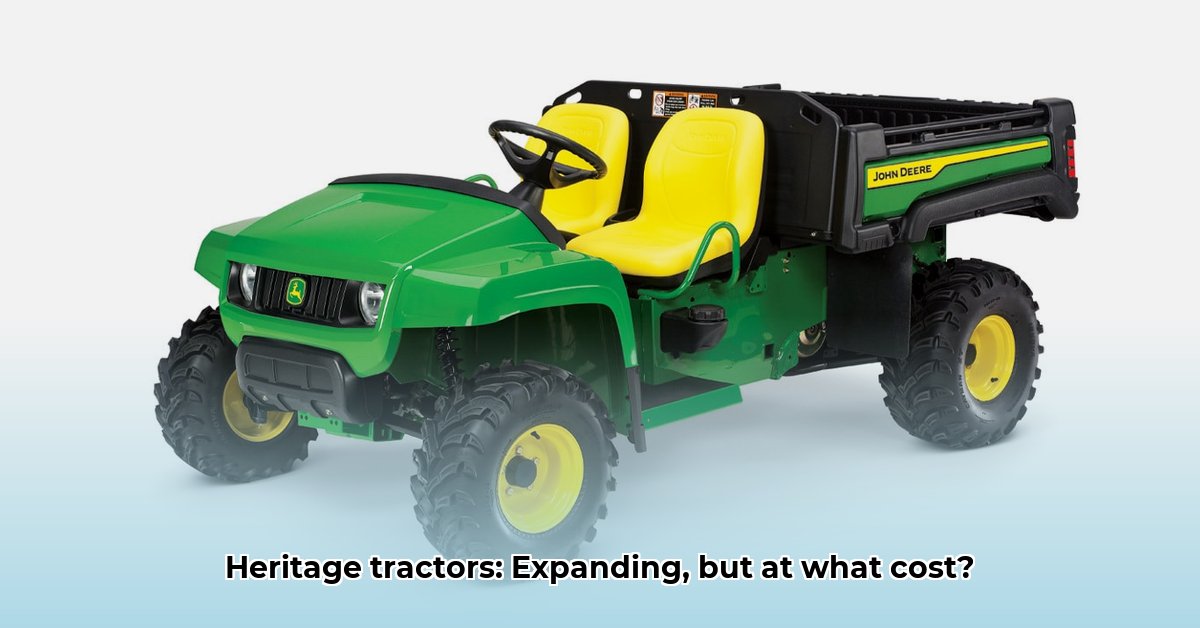
Heritage Tractor's Missouri Expansion: A Booming Market, But What About Sustainability?
Heritage Tractor recently opened twenty-two new locations across southwest Missouri and northwest Arkansas, significantly expanding its reach and accessibility for farmers of all sizes. This expansion promises increased convenience – easier access to repairs, maintenance, and potentially competitive pricing – but raises questions about the company's commitment to sustainable agricultural practices. While the increased availability of equipment and services could boost agricultural efficiency, the lack of a clear sustainability focus in Heritage Tractor's marketing materials prompts deeper scrutiny. Does this expansion signal a broader commitment to environmentally friendly farming, or is it simply business as usual? For more information on specific locations, visit Heritage Tractor locations.
The Sustainability Question: A Critical Analysis
A review of Heritage Tractor's online presence reveals a noticeable absence of explicit messaging regarding sustainable agricultural practices or eco-friendly equipment. While their inventory includes a wide range of machinery, from hay balers to advanced poultry handling systems, the company's emphasis on "used equipment with huge discounts" suggests a focus on affordability rather than environmental responsibility. The prevalence of used equipment, especially older models, may not always reflect the most fuel-efficient or low-emission options, potentially hindering attempts to promote sustainability. Is Heritage Tractor missing a critical opportunity to champion more environmentally conscious choices within the agricultural sector? This lack of emphasis raises concerns about its long-term impact on the region's commitment to sustainable agriculture.
Stakeholders and Their Interests: A Multifaceted Impact
Heritage Tractor's expansion impacts a variety of stakeholders, each with distinct short-term and long-term concerns.
| Stakeholder | Short-Term Impact | Long-Term Impact |
|---|---|---|
| Small-Scale Farmers | Increased access to service and repairs; potentially lower costs | Need to carefully weigh initial equipment costs against long-term savings and fuel efficiency. |
| Large-Scale Farmers | Potential for bulk discounts and streamlined operations. | Opportunities for data-driven precision agriculture and integration of sustainable practices; cost-benefit analysis crucial. |
| Heritage Tractor | Increased market share and revenue growth. | Needs to proactively develop and market sustainable equipment and services to maintain competitiveness and attract environmentally conscious customers. |
| Local Communities | Potential job creation and economic stimulus. | Long-term economic benefits are contingent upon the sustainability of agricultural practices in the region. |
| Environmental Groups | Potential concerns about increased emissions if sustainability isn't prioritized. | Potential for collaborations to promote environmentally friendly farming methods. |
Risk Assessment: Navigating the Challenges Ahead
Several factors could hinder Heritage Tractor's ability to meaningfully contribute to sustainable agriculture.
| Risk Factor | Likelihood | Impact | Mitigation Strategies |
|---|---|---|---|
| Lack of Sustainable Products | High | Significant | Develop and actively market eco-friendly equipment and services; partner with green technology companies. Invest in research and development of sustainable solutions. |
| Intense Competition | High | Moderate | Focus on exceptional customer service, build strong relationships with farmers, and provide unique value-added services. |
| Economic Uncertainty | Moderate | Significant | Offer flexible financing options and explore strategies to mitigate price volatility for farmers. |
| Changing Regulations | Low | Moderate | Stay informed about evolving environmental regulations and adapt business practices proactively. |
A Call to Action: Charting a Sustainable Course
Heritage Tractor's significant market presence positions the company to be a leader in promoting sustainable agriculture within Missouri and beyond. However, achieving this requires a demonstrable commitment to environmental responsibility that extends beyond simply providing equipment. A successful strategy needs to encompass the following key elements:
Invest in Sustainable Equipment: Prioritize the acquisition and marketing of fuel-efficient, low-emission equipment with a proven track record of environmental responsibility. "How will Heritage Tractor actively promote and prioritize sustainable equipment in its inventory?" is a critical question that must be answered.
Establish Transparent Communication: Actively and clearly communicate sustainability goals and initiatives to both farmers and the public. Accountability is crucial in building trust and demonstrating commitment.
Promote Educational Outreach: Develop and implement educational programs for farmers on sustainable farming practices and the technologies needed to support them. "What concrete steps will Heritage Tractor take to support and educate farmers on sustainable practices?" is a key area demanding proactive action.
Foster Strategic Collaborations: Partner with local and national sustainable agriculture organizations and initiatives to share best practices and advance knowledge within the community.
The expansion of Heritage Tractor presents a unique opportunity to shape the future of Missouri's agricultural landscape. The company's decisions regarding sustainability will have a profound impact, not only on its own success but also on the environmental health and economic prosperity of the region. The path forward demands a clear commitment to integrating sustainability into its core business model.
Finding Sustainable Options at Heritage Tractor: A Farmer's Guide
While Heritage Tractor's website doesn't currently emphasize sustainable equipment, farmers seeking eco-friendly options can take a proactive approach:
Directly Inquire: Contact Heritage Tractor directly via phone or email, specifically asking about fuel efficiency, emissions, and equipment lifespan.
Thoroughly Examine Product Specifications: Carefully review product literature and specifications for clues indicating sustainability features, even if not explicitly marketed.
Compare with Competitors: Research competitors’ offerings to identify sustainability standards and features that should be present in comparable Heritage Tractor equipment.
Utilize Industry Knowledge: Stay informed on sustainable agricultural technologies to better assess the environmental impact of Heritage Tractor’s equipment.
Heritage Tractor's long-term success hinges on adapting to the evolving demands of the agricultural market, embracing sustainable practices, and communicating these efforts transparently. Failure to address these issues will risk alienating environmentally conscious customers and limiting its growth potential, especially in a market increasingly driven by concerns for environmental sustainability.